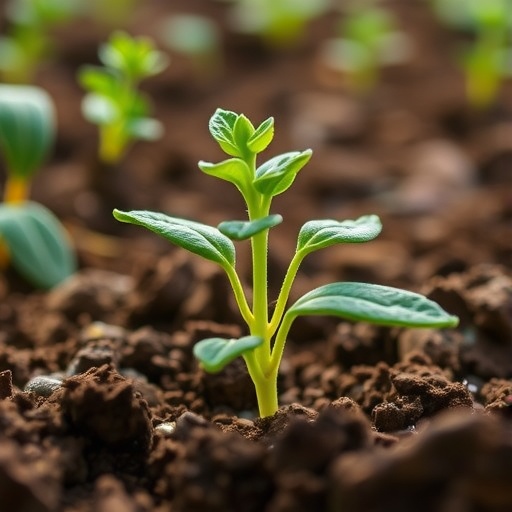In an era marked by increasing environmental concerns and a pressing need for sustainable agricultural practices, researchers are turning their attention to the unseen heroes of the soil: beneficial microorganisms. A recent study conducted by Moradi and Sarikhani delves into the world of beneficial soil bacteria, examining their potential to significantly enhance plant growth. This groundbreaking research brings to light the symbiotic relationships between plants and microbes, emphasizing how these interactions can be harnessed to improve agricultural outputs while minimizing reliance on chemical fertilizers.
The primary objective of the study was to identify specific strains of beneficial bacteria that could be used as inoculants for various crops. This process involved thorough screening and meticulous evaluation of different soil bacteria to determine their impact on plant development. Soil health and plant productivity are intrinsically linked, and the findings underscore the importance of microorganisms as natural allies for farmers.
To conduct the research, the team collected soil samples from diverse agricultural regions. These samples acted as a reservoir of microbial diversity, yielding a rich variety of bacteria. The researchers utilized a series of biochemical tests to isolate and characterize the bacteria, assessing traits such as nitrogen fixation, phosphate solubilization, and growth-promoting properties. These attributes are crucial, as they can enhance nutrient availability for plants, leading to improved growth rates and yields.
Once the beneficial strains were identified, the next phase of the study evaluated their effects on plant growth. The experimental setup involved inoculating plants with selected bacterial strains and comparing their growth with control groups that received no bacterial treatment. Inoculated plants exhibited noticeable improvements in root development, increased biomass, and heightened resilience against environmental stressors. This supports the concept of biofertilization, where microorganisms play a pivotal role in optimizing nutrient uptake and promoting overall plant health.
A significant aspect of the study was the incorporation of organic matter in conjunction with bacterial inoculation. Organic matter is known to enhance soil structure and fertility, providing an ideal environment for microbial activity. The findings indicated that the combination of beneficial bacteria and organic matter resulted in synergistic effects on plant growth, revealing that these two factors complement each other in promoting agricultural sustainability.
While the research primarily focuses on the immediate effects of beneficial bacteria on plant growth, it also opens the door to long-term implications for soil health and sustainability. Healthy soil ecosystems are vital for food security, and understanding the role of bacteria can guide agricultural practices that preserve this precious resource. The study highlights the necessity for biological models that can be integrated into current farming practices, paving the way for biodynamic agriculture.
The implications of this research extend beyond mere plant growth; they suggest a paradigm shift in how we approach agriculture. By fostering beneficial microbial communities, farmers may reduce their dependence on synthetic fertilizers and pesticides, transitioning toward a more sustainable model of food production. This is critical in the context of climate change and the growing demand for food resources worldwide.
Furthermore, the research calls for a reevaluation of how we perceive soil management. Instead of viewing soil merely as a medium for plant cultivation, it should be recognized as a dynamic ecosystem teeming with life. Efforts to restore and enhance soil biodiversity could lead to improved agricultural practices and healthier, more resilient crops.
The data and results presented by Moradi and Sarikhani not only bolster the scientific understanding of beneficial soil microorganisms but also provide a roadmap for agricultural innovation. Their findings advocate for integrating microbiological insights into crop management strategies, ultimately leading to increased food security and sustainable agricultural systems worldwide. The diagnosis of soil health via microbial analysis might become a standard practice in the future, improving soil management techniques across various farming landscapes.
As the agricultural sector grapples with challenges posed by population growth and climate change, the importance of research like that of Moradi and Sarikhani cannot be overstated. It underscores the potential and necessity for sustainable agriculture that harmonizes with natural ecosystems. This aligns with a broader movement towards regenerative agriculture, which seeks to improve and restore the health of our planet through innovative techniques.
In conclusion, the study offers compelling evidence that beneficial soil bacteria hold significant promise for enhancing plant growth and sustainability in agriculture. By reevaluating the role of soil microorganisms, researchers, farmers, and policymakers can collaborate to foster a more resilient agricultural landscape that prioritizes environmental health. The future of agriculture may very well depend on our ability to leverage the power of these microbial allies and Adopt practices that support a thriving ecosystem.
Subject of Research: Beneficial Soil Bacteria and Their Effects on Plant Growth
Article Title: Screening and identification of beneficial soil bacteria: evaluating inoculation effects on plant growth with and without organic matter.
Article References:
Moradi, S., Sarikhani, M.R. Screening and identification of beneficial soil bacteria: evaluating inoculation effects on plant growth with and without organic matter.
Int Microbiol (2025). https://doi.org/10.1007/s10123-025-00704-0
Image Credits: AI Generated
DOI: https://doi.org/10.1007/s10123-025-00704-0
Keywords: beneficial bacteria, plant growth, organic matter, sustainable agriculture, microbial diversity, soil health, biofertilization.




